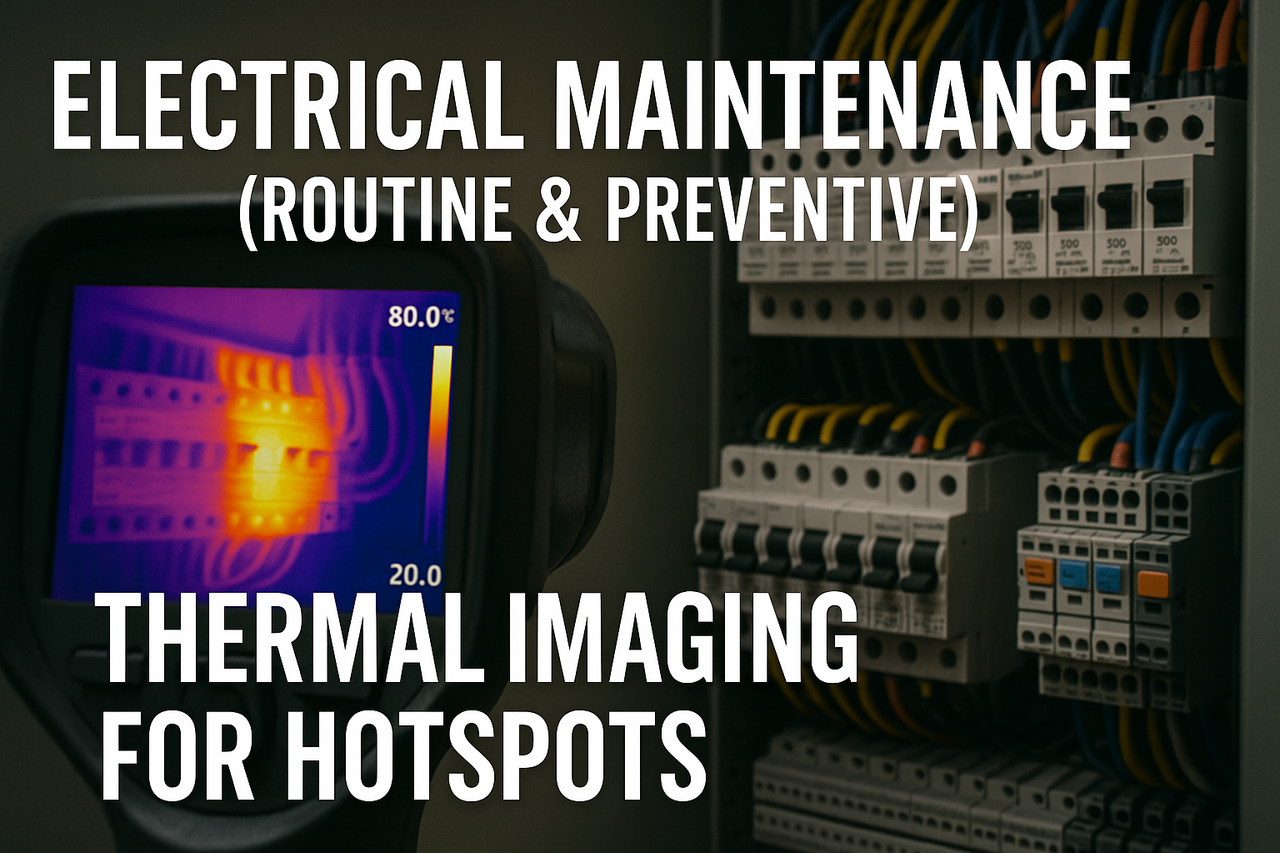
Posted on Monday, November 17, 2025
Thermal imaging is one of the most powerful diagnostic tools in modern electrical maintenance. On a roll forming machine, electrical hotspots often develop long before a failure occurs — sometimes weeks or even months ahead of the first noticeable problem.
Using infrared thermal cameras, technicians can detect rising temperatures in:
Electrical terminals
Breakers
Contactors
Overload relays
VFDs and servo drives
Power supplies
Transformers
Motors
Busbars
Encoder power circuits
Safety relays
Cable connections
A hotspot is usually the first sign of a hidden electrical issue such as loose terminals, high resistance, overloaded circuits, harmonics, or failing components. Without thermal imaging, these problems are invisible — until the machine suddenly stops, a breaker trips, or a component burns out.
This guide explains why thermal imaging is essential for roll forming machines, how hotspots develop, and how Machine Matcher technicians use professional infrared inspections to prevent major electrical failures.
Roll forming machines operate in high-load, high-vibration, high-duty environments, making them especially vulnerable to electrical heating problems.
Loose or under-torqued terminals
Breakers and contactors degrading over time
Overloaded motors
VFD and servo drive overheating
Poor grounding or phase imbalance
Harmonics generated by multiple drives
Dust buildup restricting airflow
Undersized cables
Oxidized or corroded connections
Because heat rises gradually before failure, thermal imaging provides early detection and helps prevent:
Motor burnout
Component fires
VFD failure
PLC shutdowns
Random machine stoppages
Costly production downtime
Machine Matcher uses infrared inspections to monitor every heat-critical component.
PLC modules
VFDs
Servo drives
Power supplies
Relays
Breakers
Contactors
Overloads
Terminal blocks
DC power rails
Grounding busbars
Loose terminals
Internal contact welding
DC supply overload
Overheated drive IGBTs
Ventilation failure
Windings
Bearings
Junction boxes
Cable terminations
Overloading
Misalignment
Bearing failure
Weak insulation
Phase imbalance
Harmonics
Overcurrent
Incorrect parameters
Cooling fan failure
Internal board overheating
Bad heat sinks
Hot drives are a major cause of unexpected shutdowns.
Pump motors
Solenoid valves
Coil windings
HPU motor contactors
Overheating here causes pressure loss and hydraulic timing problems.
Although low voltage, these components can still heat due to:
High resistance
Poor shielding
Power supply noise
Loose wiring
This leads to cut-length errors and inconsistent feedback.
Thermal thresholds vary, but general guidelines include:
Normal operating range (depending on component).
Warning zone — rising temperature indicates resistance or load.
Critical zone — failure imminent.
Danger — immediate shutdown or component replacement required.
Machine Matcher uses calibrated infrared tools to measure exact temperatures and compare them to component ratings.
Below are the most common reasons for electrical heating in roll forming machines.
High resistance
Heat buildup
Arcing
Erratic signals
VFD undervoltage
Motor overheating
This is the #1 cause of electrical hotspots.
Undersized motors
Wrong breaker or overload setting
Excessive coil load
Running heavy panels or thick material
Overloaded components run hot before failing.
High harmonic distortion heats:
Transformers
VFDs
Power supplies
Motor cables
Neutral conductors
Common in factories with multiple drives and welders.
Dust and metal debris restrict airflow, causing:
VFD temperature faults
Servo drive derating
Breakers running hot
Old components increase resistance and heat:
Breakers
Contactors
Relays
Overloads
Power supplies
Aging components often show heat months before they fail.
Machine Matcher technicians follow a structured infrared inspection procedure:
Check previous fault logs:
VFD trips
Motor overload history
PLC resets
Sensor instability
Capture thermal images of:
Drives
Contactors
Breakers
Power rails
Modules
Wiring ducts
Load conditions reveal real heating patterns.
Identifies imbalance or overload.
Any component >10–15°C above similar components indicates a fault.
Examples:
Loose terminal
Failing contactor
Blocked ventilation
Undersized cable
VFD with internal damage
Includes:
Infrared images
Temperature readings
Fault description
Risk level
Corrective actions
Replacement recommendations
Thermal imaging is one of the highest ROI maintenance tools available.
We provide:
Full infrared electrical inspections
Load-based temperature analysis
VFD & servo thermal testing
Motor thermal analysis
Breaker/contactors temperature evaluation
Harmonic & grounding diagnostics
Full preventive maintenance packages
Panel cleaning & cooling upgrades
24/7 remote support
Each service includes:
Thermal photos
Temperature reports
Risk scoring
List of improvements
Technician recommendations
Thermal imaging is a critical tool for maintaining healthy electrical systems in roll forming machines. By identifying hotspots before they turn into failures, Machine Matcher helps factories reduce downtime, improve safety, and protect valuable equipment.
Machine Matcher now offers full electrical technician services for roll forming machines — including diagnostics, rewiring, testing, encoder calibration, PLC programming, electrical audits, and preventive maintenance.
We support all machine types and all global regions.
Contact us today for immediate technical assistance or to schedule a full electrical inspection at your factory.
Looking for the right roll forming machine or expert guidance on your next project? Machine Matcher is here to help. Our global team provides 24/7 technical support, expert advice, and guidance on machine selection, setup, and maintenance—ensuring your operations run smoothly from day one.
With team members based worldwide—including the UK, USA, Middle East, and beyond—we are equipped to assist buyers across the globe. Whether you’re sourcing a single machine or upgrading an entire production line, our experts are ready to provide tailored solutions and support every step of the way.
Get in touch now and let Machine Matcher help you find the perfect roll forming machine for your business.
United Kingdom (Main Office)
Phone: +44 20 335 56554
United States
Phone: +1 407 559 7948
Mobile / WhatsApp: +44 7816 972935
Email: [email protected]

Used Purlin Roll Forming Machines for Sale Worldwide
Posted on Sunday, January 25, 2026
Pre-Owned Roll Forming Machines for Purlin & Structural Steel Profiles

Used Roof Panel Roll Forming Machines for Sale Worldwide
Posted on Sunday, January 25, 2026
Pre-Owned Roll Forming Machines for Roofing Panel Production

Used Roll Forming Machines for Sale Worldwide
Posted on Tuesday, January 20, 2026
Pre-Owned Roll Forming Machines with Inspection, Verification & Global Support

Steel Coil Supply for Roll Forming Machines Worldwide
Posted on Tuesday, January 20, 2026
Reliable Steel Coil Supply for Roll Forming, Fabrication & Manufacturing Applications
Copyright 2026 © Machine Matcher.